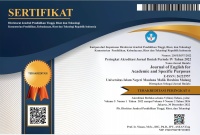TEACHERS’ PERSPECTIVE ON THE CHALLENGES OF TEACHING ENGLISH FOR SPECIFIC PURPOSES IN INDONESIA
Abstract
teaching and learning styles cause learning failure, frustration, and
demotivation. The implementation of ESP in Indonesia mostly adopts
Content-Based Instruction which requires a lot of effort from the teacher.
The teachers’ perspectives are important to reveal the actual challenges in
the classroom to determine the best solution. A questionnaire was
distributed to around thirty lecturers of ESP to be analyzed statistically by
using the Likert scale to show their views on the obstacles and challenges
of teaching ESP. There are four domains that are analyzed which are,
opinions, attitudes, preferences, and perceptions of the subjects. The
researcher counted and found out the average score, middle point in the
score distribution, point where the most score was obtained, finding the
average deviation of each score from the mean, and percentage of the
proportion of the group population. From all of those calculation results,
the researcher derives conclusion by comparing to the result of the
interview as well. It comes to the conclusion that from four fields that
had been studied, attitudes and preferences take the highest rank of the
teachers’ challenge.
Full Text:
PDFReferences
Akbari, Z. (2015). Current challenges in teaching/learning English for EFL learners: The case of junior high school and high school. Procedia - Social and Behavioral Sciences, Vol. 199 Page 394 – 401.
Alharbi, A. A. (2015). Improving Students' English Speaking Proficiency in Saudi Public Schools. International Journal of Instruction, Vol. 8, No.1 Page 105-116.
Al-Jamal, D. A. &. Al-Jamal, G. A. (2014). An Investigation of the Difficulties Faced by EFL Undergraduates in Speaking Skills. English Language Teaching, Vol. 7, No. 1 Page 19-27.
Alkhawaldeh, A. (2010). The Challenges Faced by Jordanian English Language Teachers at Amman 1st and 2nd Directorates of Education. Retrieved on 6th of December 2016
on https://www.questia.com.
Arikunto, S. (2006). Prosedur Penelitian: Suatu Pendekatan Praktek, Edisi Revisi, PT, Rineka Cipta, Jakarta.
Arifin, Z. (2009). Evaluasi Pembelajaran. Bandung: PT. Remaja Rosdakarya.
Alyan, A. A. (2013). Oral Communication Problems Encountering English Major Students: Perspectives of Learners and Teachers in Palestinian EFL University Context Arab World English Journal, Volume.4 Number.3, Page.226-238.
Bolton, K. & Kachru, B. B. (2006). World Englishes Critical Concept in Linguistics. Routledge: New York.
Davis, J. (2016). Teaching ESL: 10 Common Problems in the Classroom. Retrieved on
https://owlcation.com/academia/Teaching-ESL 30th of November 2016.
Elyas, T. & Al Grigri, W. H.A. (2014). Obstacles to Teaching English in Saudi Arabia Public Schools: Teachers’ and Supervisors’ Perceptions. Retrieved on August 23rd, 2016
on www.eajournal.org.
Kautsar & Yunial, S. D. (2012). Pengaruh Persepsi Siswa Tentang Keberadaan Guru Ppl Mata Pelajaran Bahasa Jerman Terhadap Minat Belajarnya. Retrieved on 12th of January 2014 on journal-online.um.ac.id
Kirkpatrick, A. (2012). English in ASEAN: Implications for Regional Multilingualism. Retrieved on 15th of January 2016 on
http://www98.griffith.edu.au/dspace/bitstream/handle/10072/52188/85961
_1.pdf
Kusni. (2013). Reformulating English for Specific Purposes (ESP) In Indonesia: Current Issues And Future Prospects. SELT 2013 Proceeding.
Kuswandono, P. (2014). University mentors’views on reflective practice in microteaching: building trust and genuine feedback. Reflective Practice, Vol. 15, No. 6, 701–717.
Kuntz, P. S. (1996). Beliefs about Language Learning: The Horwitz Model. Retrieved on 23rd of December 2016 on http://files.eric.ed.gov.
Lakshmi, Bh.V.N. (2013).Challenges in Teaching Language and Literature: An EFL Perspective. IOSR Journal Of Humanities And Social Science (IOSR-JHSS), Volume 15, Issue 6 PP 49-53.
Latief, A. (2012). Research Methods on Language Learning an Introduction. Malang: UM Press.
Lauder, A. (2008). The Status and Function of English in Indonesia: A Review of Key Factors. Retrieved on 12th of January 2016 on https://www.researchgate.net.
Lestari, N. T. (2012). Profesional Guru dan Tanatangan Sebagai Profesi. Retrieved on 12th of June 2016 on http://www.kompasiana.com.
Loubazid, M. (2012). Exploring the Difficulties Facing EFL Students’ Participation in Oral Expression Course The case study of third-year LMD students at Biskra University. Biskra: Unpublished Dissertation.
Mahrooqi, Rahma Al & Denman (ed), Christoper. (2015). Issues in English Education in the Arab World. Cambridge Scholar Publishing.
Mattarima, K, & Hamdan, A.. R. (2011). Learners’ Motivation And Learning Strategies In English Foreign Language (EFI) In Indonesian Context. Journal of Edupres, Volume 1 September 2011, Pages 100-108.
Megawati, F. (2015). Challenges in Teaching EFL for Pre-Service Young Learner Teachers. Proceedings The 62nd TEFLIN International Conference 2015. Page 847-888. Denpasar: TEFLIN International Conference.
Mistar, J. (2005). Teaching English as a Foreign Language (TEFL) in Indonesia. In G. Braine (ed.), Teaching English to the World: History, Curriculum, and Practice (pp. 75-85). New Jersey: Lawrence Erlbaum Associates, Inc.
Moon, J. (2000). Children learning English. Oxford: Macmillan Heinemann.
Peackok, M. (2001). Match or mismatch? Learning styles and teaching styles in EFL. International Journal of Applied Linguistics, Volume 11, Issue 1June 2001 Pages 1–
Poedjiastutie, D. & Oliver, R. (2017). English Learning Needs Of Esp Learners: Exploring Stakeholder Perceptions at an Indonesian University. TEFLIN Journal, Volume 28, Number 1, January 2017.
Pribadi, A. K. (2016). English Teachers" Obstacles in Teaching and Learning at SMP Negeri 1 Moyudan Sleman. Retrieved on August 23rd, 2016 on www.englishacademia.edu.
Richards, J. C. (1998). Beyond training. Cambridge, U.K.: Cambridge University Press.
Riley, P. A. (2006). The Beliefs of First Year Japanese University Students Towards the Learning of English. Retrieved on 23rd of December 2016 on https://core.ac.uk.
Sadiman, Arief. S. (2004). Challenges in Education in South East Asia. SEAMEO SEAMOLEC, India. Retrieved on 16th of February 2015 on www.seameo.org.
Shinde, M. B & Karekatti, T. K. (2012). Pre-service Teachers’ Beliefs about Teaching English to Primary School Children. International Journal of Instruction, Volume 5, Number 1, Page 69-86.
Smith, D. B. (1996). Teacher decision making in the adult ESL classroom. In D. Freeman & J. C.Richards (Eds.), Teacher learning in language teaching (pp. 197-216). Cambridge, U.K.: Cambridge University Press.
Trappes-Lomax, H., & McGrath, I. (Eds.). (1999). Theory in language teacher education. Harlow, Essex, U.K.: Longman.
Vickers, A. (2009). English Language Teaching in Indonesia. Retrieved on 23rd of February 2014 on http://blogs.usyd.edu.au.
Weni, S. (2016). Bahasa Inggris di SD; Kebijakan, Guru dan Siswa. Retrieved on 28th of September 2016 on http://www.kompasiana.com.
Yulia, Y. (2014). An Evaluation of English Language Teaching Programs in Indonesian Junior High Schools in the Yogyakarta Province. Retrieved on 12th of January 2014 on
https://researchbank.rmit.edu.au.
Yuwono, G..I & Harbon, L. (2010). English Teacher Professionalism and Professional Development: Some Common Issues in Indonesia. Asean TEFL Journal, Volume 12 Issue 3 September 2010, page 145-163
DOI: https://doi.org/10.18860/jeasp.v1i1.5243
Refbacks
- There are currently no refbacks.





Editorial Office:
Pusat Pengembangan Bahasa
Program Khusus Pengembangan Bahasa Inggris (PKPBI)
Universitas Islam Negeri Maulana Malik Ibrahim Malang
Gedung C lantai 1
Jl. Gajayana No 50 Kota Malang, Jawa Timur, Indonesia
Kode Pos 65144, Telp/Fax : (0341) 570872
Email: jeasp@uin-malang.ac.id







